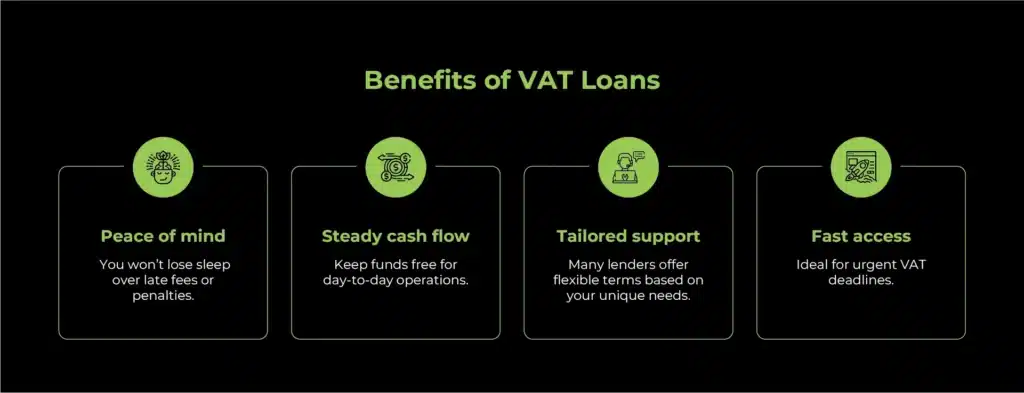It’s the end of the quarter. You’re staring at your VAT bill, and it feels like the weight of the world is pressing down on your shoulders. You’ve worked tirelessly to keep your business afloat, but now, this looming tax payment threatens to upend everything. Sound familiar?
If you’ve ever felt this way, you’re not alone. Thousands of UK business owners face the same challenge every VAT season. The good news? There are solutions – and VAT loans are one of them. But how do VAT loans compare with other short-term financing options?
From short-term business loans to invoice financing, this guide explores the pros and cons of VAT loans and alternative financing solutions. By the end, you’ll have a clearer picture of what’s right for your business.
Understanding VAT Loans
What Are VAT Loans?
A VAT loan is a specialised financial product that helps businesses meet their VAT obligations. Instead of using your working capital to cover VAT, you borrow the required amount and repay it in manageable instalments.
Imagine you’ve got a big order to fulfil, but that VAT bill is due. Instead of sacrificing operational funds, a VAT loan covers the bill, letting you focus on growing your business.
How Do VAT Loans Work?
Here’s how a VAT loan typically works:
- Application: you apply for the loan, specifying the amount you need to cover your VAT bill.
- Approval: most lenders offer quick approval, often within 24-48 hours.
- Disbursement: once approved, the funds are either sent to HMRC directly or deposited into your account.
- Repayment: you repay the loan in monthly instalments over an agreed term, usually 3-12 months.
Benefits of VAT Loans
- Peace of mind: you won’t lose sleep over late fees or penalties.
- Steady sash flow: keep funds free for day-to-day operations.
- Tailored support: many lenders offer flexible terms based on your unique needs.
- Fast access: ideal for urgent VAT deadlines.
Take Maria, for instance. She runs a small marketing agency in Manchester. Despite steady growth, her quarterly VAT bill always seemed to disrupt her cash flow. After struggling with late fees and penalties, Maria decided to use a VAT loan. The result? She met her VAT obligations on time without compromising her payroll or operations.
VAT Eligibility Criteria
To qualify for a VAT loan, lenders often require:
- Proof of VAT liability.
- A steady business income.
- Basic financial statements.
- Creditworthiness.
Short-Term Business Loans in the UK
What Are Short-Term Business Loans?
Short-term business loans are versatile financing solutions made to address immediate cash flow needs. They are designed for those “just get me through this” moments. Whether it’s fixing broken equipment or bridging a gap between client payments, these loans are quick, versatile, and a lifesaver for many businesses.
How Do They Compare to VAT Loans?
While VAT loans typically focus on a single purpose (paying VAT bills), short-term business loans offer more flexibility and freedom in how you use the funds. However, they often come with higher interest rates, especially for unsecured options.
For example, a VAT loan might have a lower rate since it’s tied to a specific, predictable expense, while short-term loans might require collateral or higher fees to offset risks.
When Are Short-Term Loans Preferable?
Unexpected Costs: When you face expenses beyond VAT payments, such as equipment repairs or payroll.
Growth Opportunities: To finance a time-sensitive project or inventory purchase.
Let’s talk about Jack, who owns a construction company. When a critical machine broke down mid-project, he needed funds immediately. A short-term loan got him back on track. But for his VAT payments, Jack prefers VAT loans – lower rates and a clearer purpose.
Alternative Business Financing Options
When VAT loans or short-term loans don’t fit, there are other routes to consider:
Invoice Financing
Struggling with late-paying clients? Invoice financing lets you access cash tied up in unpaid invoices. A lender advances you a percentage of the invoice value, which you repay once your client settles their bill.
- Pros: Quick funds when you need them.
- Cons: If your clients delay payment, fees can pile up.
Merchant Cash Advances
Have you ever wished your repayments were adjusted to your sales? A merchant cash advance might be the answer. You get a lump sum upfront and repay through a percentage of your daily card sales.
- Pros: No fixed repayments, aligns with sales volume.
- Cons: Can become expensive if sales slow down.
Crowdfunding
If you have a creative idea or a compelling story, crowdfunding can provide the capital you need. Platforms like Kickstarter and GoFundMe let you raise funds from individuals.
- Pros: No repayment if equity-based, great for brand exposure.
- Cons: Requires significant effort and marketing.
Comparing VAT loans vs other short-term financing solutions
Here’s a clear breakdown of how these options compare:
| Financing Option | Best For | Pros | Cons |
| VAT Loans | VAT payments only | Lower interest, quick approval | Limited to VAT needs |
| Short-Term Loans | General business expenses | Flexible use, fast funding | Higher rates, possible collateral |
| Invoice Financing | Cash flow tied to unpaid invoices | Quick cash release | Fees accumulate if clients delay payment |
| Merchant Cash Advances | Businesses with fluctuating revenue | Aligns with sales, no fixed payments | Can become expensive during slow periods |
| Crowdfunding | Innovative projects or startups | No repayments, brand exposure | Time-intensive, uncertain success |
Conclusion
Choosing the right financing option is about more than just interest rates and repayment terms. It’s about finding a solution that aligns with your business’s needs and goals.
Remember, the goal isn’t just to solve today’s problem but to set your business up for sustainable growth. With the right financing, you can face any challenge with confidence.
So, the next time a VAT deadline or unexpected expense looms, take a breath. You’ve got options. And with partners like Funding Guru, you’ll always have the guidance and support you need to thrive.
FAQs
Are VAT loans only for large businesses?
No, VAT loans are ideal for businesses of all sizes. Whether you’re a sole trader or a growing SME, they’re designed to help you manage VAT payments without straining your cash flow.
How quickly can I get a VAT loan?
Many lenders offer approvals within 24-48 hours, making them a great option for urgent VAT deadlines.
Can I get a VAT loan if my business has inconsistent cash flow?
Yes, but lenders will evaluate your revenue history to ensure you can meet repayment terms.
How do I decide which financing option is right for me?
Evaluate your specific needs, repayment capacity, and growth plans. Don’t hesitate to consult experts like Funding Guru for tailored advice.
Can crowdfunding work for traditional businesses?
Yes, but success depends on your ability to market your campaign and engage potential backers.



